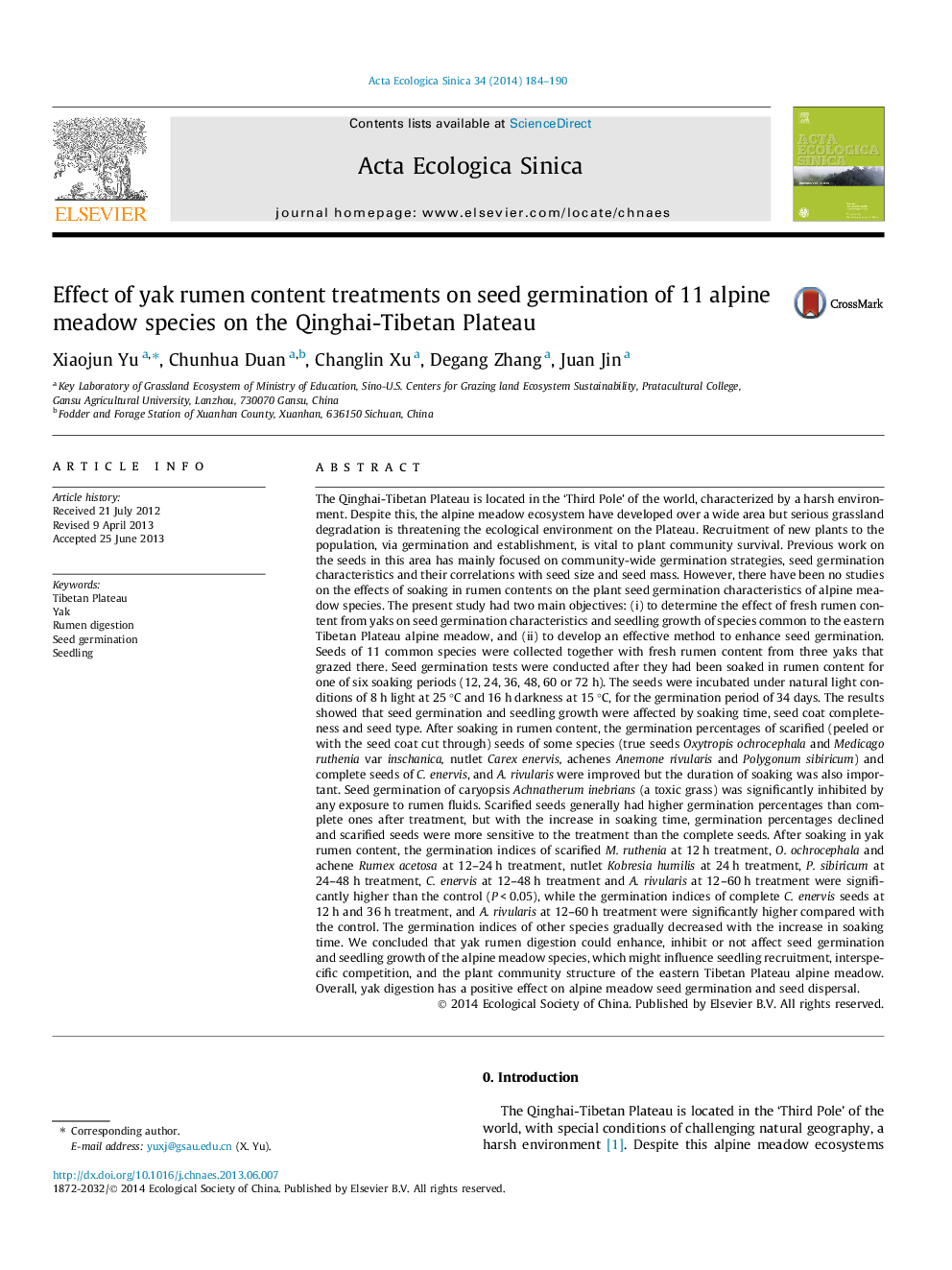| Article ID | Journal | Published Year | Pages | File Type |
|---|---|---|---|---|
| 10179837 | Acta Ecologica Sinica | 2014 | 7 Pages |
Abstract
The Qinghai-Tibetan Plateau is located in the 'Third Pole' of the world, characterized by a harsh environment. Despite this, the alpine meadow ecosystem have developed over a wide area but serious grassland degradation is threatening the ecological environment on the Plateau. Recruitment of new plants to the population, via germination and establishment, is vital to plant community survival. Previous work on the seeds in this area has mainly focused on community-wide germination strategies, seed germination characteristics and their correlations with seed size and seed mass. However, there have been no studies on the effects of soaking in rumen contents on the plant seed germination characteristics of alpine meadow species. The present study had two main objectives: (i) to determine the effect of fresh rumen content from yaks on seed germination characteristics and seedling growth of species common to the eastern Tibetan Plateau alpine meadow, and (ii) to develop an effective method to enhance seed germination. Seeds of 11 common species were collected together with fresh rumen content from three yaks that grazed there. Seed germination tests were conducted after they had been soaked in rumen content for one of six soaking periods (12, 24, 36, 48, 60 or 72 h). The seeds were incubated under natural light conditions of 8 h light at 25 °C and 16 h darkness at 15 °C, for the germination period of 34 days. The results showed that seed germination and seedling growth were affected by soaking time, seed coat completeness and seed type. After soaking in rumen content, the germination percentages of scarified (peeled or with the seed coat cut through) seeds of some species (true seeds Oxytropis ochrocephala and Medicago ruthenia var inschanica, nutlet Carex enervis, achenes Anemone rivularis and Polygonum sibiricum) and complete seeds of C. enervis, and A. rivularis were improved but the duration of soaking was also important. Seed germination of caryopsis Achnatherum inebrians (a toxic grass) was significantly inhibited by any exposure to rumen fluids. Scarified seeds generally had higher germination percentages than complete ones after treatment, but with the increase in soaking time, germination percentages declined and scarified seeds were more sensitive to the treatment than the complete seeds. After soaking in yak rumen content, the germination indices of scarified M. ruthenia at 12 h treatment, O. ochrocephala and achene Rumex acetosa at 12-24 h treatment, nutlet Kobresia humilis at 24 h treatment, P. sibiricum at 24-48 h treatment, C. enervis at 12-48 h treatment and A. rivularis at 12-60 h treatment were significantly higher than the control (P < 0.05), while the germination indices of complete C. enervis seeds at 12 h and 36 h treatment, and A. rivularis at 12-60 h treatment were significantly higher compared with the control. The germination indices of other species gradually decreased with the increase in soaking time. We concluded that yak rumen digestion could enhance, inhibit or not affect seed germination and seedling growth of the alpine meadow species, which might influence seedling recruitment, interspecific competition, and the plant community structure of the eastern Tibetan Plateau alpine meadow. Overall, yak digestion has a positive effect on alpine meadow seed germination and seed dispersal.
Related Topics
Life Sciences
Agricultural and Biological Sciences
Ecology, Evolution, Behavior and Systematics
Authors
Xiaojun Yu, Chunhua Duan, Changlin Xu, Degang Zhang, Juan Jin,
